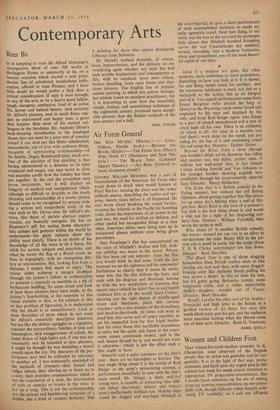Air Force General
ONE MAN MUTINY. (Warner.) = JURAL. (Odeon, Marble Arch.) —BEYOND THE RIVER. (Rialto.)—THE ExTRA DAY. (Plaza.) WHO DONE IT? (Dominion and New Vic- toria.) — THE BLACK TENT. (Leicester Square Theatre.)—Au BABA. (General re- lease, Gaumont circuit.) GENERAL WILLIAM MITCHELL was a sort of Nostradamus of the American Air Force who wrote down in detail what would happen at Pearl Harbor, naming the place and the rather unlikely enemy, describing the tactics and sur- prise, twenty years before it all happened. He also wrote about breaking the sound barrier. crossing the Atlantic or the Pacific for bombing raids, about the importance of air power in the next war, the need for civilian air defence, and other useful but unregarded things at a time when American pilots were being sent up in antiquated planes without even being given parachutes.
Otto Preminger's film has concentrated on the story of Mitchell's decline and fall, with- out rubbing any noses in the moral. Private life has been cut out entirely: from the film you would think he had none. Until the last moment we see his rightness and his opponents' foolishness so clearly that it seems he surely must win; but the film follows the facts, and ends with his disgrace and dismissal, leaving us with the wry satisfaction of knowing that twenty years (which he didn't live to see) wpuld vindicate him to all the world. Gary Cooper. showing just the right degree of middle-aged strain and bleakness, plays this curious visionary with a nice mixture of flat-footedness and head-in-the-clouds. At times you want to prod him into some sort of angry reaction, to see his respectful love for that frigid institu- tion the army flame into justifiable impudence or spite; but the quiet, sick figure in the court- room scenes commands respect, and in the end, beaten though he is, you would not want it otherwise: which is just the effect such a film ought to have.
Sincerity and a quiet tenseness set the film's tone : there are no harangues or heroics. The best single thing about it is the acting of Rod Steiger as the army's prosecuting counsel, a performance beautifully in tune with the film's main mood. Mr. Steiger, a sleek, well-fed young man, is capable of appearing (that diffi- cult thing) charmingly sinister and (what's rarer) intellectually brilliant too. Making rings round the dogged and non-legal Mitchell at
the court-martial, he gave a short performance of such accomplished nastiness as made my scalp agreeably crawl. Next best thing, to my mind, was the way at the very end the grotesque little planes that Mitchell watched hiccuping across the vast CinemaScope sky suddenly turned, swooping, into a modern formation, silver and streamlined, one of the most beauti- ful sights of our time.
Juba! is a western not quite like other westerns, more ambitious or more pretentious, depending on how you look at it. It is slower, for one thing; better acted, for another; and the enormous landscape is used, not just as a backcloth to the action, but as an integral part of it. Two superb performances come from Ernest Borgnine (who played the herp of Marty) as the Wyoming ranch-owner loved and respected by his men and despised by his wife, and from Rod Steiger again, who brings to a part of absurd unmotivated evil a sort of crazy logic all his own. There is an authentic air about it all : for once in a western you feel there's work done on the ranch, not just riding for the fun of it and strumming round the red camp fire. Director : Delmer Daves.
Beyond the River, from a story (though you wouldn't think so) by Simenon, has riding and ranches too, but duller, politer ones. A tedious but well-acted film, it has Joseph Cotton looking liverish 'and Van Johnson as his younger brother showing anguish very creditably through his inconveniently, cheerful face. Director : Henry Hathaway.
The Extra Day is a British comedy in the Ealing manner, but without the old Ealing lightness, about getting together five film extras for an extra day's filming when a reel of film gets lost. Beryl Reid as the boss of a crooner's fan club is the best thing about it, and worth a visit just for a sight of her despairing rub- bery face. Director : William Fairchild, 'who wrote the script as well.
Who Done It? is another British comedy, but worse : custard pie run riot in an effort to out-keystone the cops. Benny Hill as the pri- vate eye is good in parts, but the script (from T. E. B. Clarke, surprisingly) lets him down. Director : Basil Dearden.
The Black Tent is one of those slogging humourless films British studios seem to like turning out now and then, with some dogged- looking actor like Anthony Steele puffing his way across a desert. In this he does his best, but it's gritty going. Bedouins, camels, some impressive ruins, and a rather improbable sheik's daughter, straight out of Vogue. Director : Basil Dearden.
Myself, I prefer the other sort of far Arabia : Fernandel and high finks in the harem in a garbled version of Ali Baba. For once this much-jilted actor gets his girl, and the audience some exquisite fooling when the thieves come out of their pots. Director : Rene G. Vuattoux.
ISABEL QUIGLY


































 Previous page
Previous page